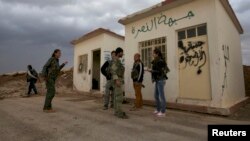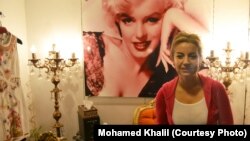In much of Syria’s Kurdish-dominated northeast, basic services are functioning and schools are open in marked contrast to other areas of the war-torn country.
That’s because Kurds have been able to maintain a strong semblance of self-governance.
The city of Qamishli has become a center of that rule, carved out by Kurdish militias who ousted al-Qaeda-affiliated jihadists.
Confidence among Kurdish activists is growing and so too is their ambition, they say. They are creating a rival to what remains of the Syrian bureaucracy in the northeast and they hope it could form the basis of a semi-autonomous state once the civil war is eventually over.
Although criticized by the Western-backed Syrian National Coalition (SNC) because they refuse to assist rebels battling to oust President Bashar al-Assad, the Kurds say they are determined to prevent their cities from suffering the fate of Aleppo and other towns contested by the rebels and Assad.
Many of them have been razed in the conflict as Assad withdrew most of his forces from the northeast early in the two-and-half year civil war.
“The Kurdish people from the start supported the revolution and they believed in the same dream of the Arab Spring, of having a free democratic society,” said activist Moaze Abdel Kareem, a 32-year-old pharmacist who heads the new Kurdish-controlled Qamishli city council.
“A lot of our people were imprisoned and tortured by Assad over the years,” he said. “But we started to think we might be able to accomplish our aims through peaceful means, as much as we can. We are not only avoiding a fight with the Syrian army but also would prefer not to fight the Free Syrian Army (FSA). But we will defend our geography.”
The Kurds control about 80 percent of the city, they say and try to ignore the presence of Syrian soldiers. They too try to disregard as much as they can the remaining Syrian state apparatus when it comes to everyday basic needs and services. Their approach is simply to ignore and not visit the handful of government buildings that still fly the red, black and white striped Syrian national flag with two green stars.
They go instead to new local Kurdish authorities that have been created from the ground up by activists from different political factions and from no factions at all, although cadres from the leftish Democratic Union Party, or PYD, are to the forefront of the initiative.
“When the situation started to collapse in the city because of the revolution, there was nobody to clean the streets, the trash piled up causing health and hygiene problems and people started to volunteer to do something about it,” Kareem said from a busy office complex taken over by the council.
Volunteer committees started to focus a year ago on trash collection and water supplies.
But the local volunteerism and activism snowballed and in early summer 32 committees in all were formed to supervise a broad range of services – including public health, sewage, energy supplies, security, and women’s issues. The council set up Syria’s first ever all-female municipal police unit.
“There are some things you still have to go to state functionaries for, like applying for a passport,” Kareem said. “But mostly you come to us.”
Funding of the new local councils comes from voluntary donations and service-fees, although Kareem says the fees are lower than those charged by the Syrian government. The 120 council workers receive token salaries and Kareem receives $70 a month.
Many Kurds are happy to be freed from the months-long reign of terror of the jihadists and welcome local rule.
“We used to close the shop very early because we were frightened about safety,’ said Dania Moon, owner of a women’s boutique in downtown Qamishli that sells clothing jihadists would have found offensive. “There were kidnappings and killings by jihadists and also by ordinary individuals.”
With stability, the exchange rate between the Syrian pound and the dollar has stabilized, although prices are still high, at least double their pre-war prices.
Locally grown fruit and vegetable are available in abundance, hawked by street vendors in Qamishli’ s narrow and busy thoroughfares, Still, stores are thinly stocked when it comes to goods from overseas. The Turks have closed much of the border with Syria’s Kurdistan.
The stability the city, which sits at the foot of the Taurus Mountains and has a population of just under 200,000, is threatened though. There is alarm at a burgeoning bombing campaign by jihadists. The latest came recently when a suicide bomber detonated a car bomb outside the internal security base near Qamishli, killing a civilian and two members of the Kurdish security forces.
Since the summer, there have been 37 car or roadside bombings and three blasts detonated by suicide bombers in Syria’s Kurdistan. More than 40 have died.
Aside from the jihadist bombing campaign, relations with the remaining Syrian troops in the Kurdish pocket are tense.
“The Assad regime knows we are strong, so it chooses not to attack us now,” said Giwan Ibrahim, one of the Kurds’ top military commanders. “And we choose not to attack Assad now, despite the fact that he is not our friend.”
That’s because Kurds have been able to maintain a strong semblance of self-governance.
The city of Qamishli has become a center of that rule, carved out by Kurdish militias who ousted al-Qaeda-affiliated jihadists.
Confidence among Kurdish activists is growing and so too is their ambition, they say. They are creating a rival to what remains of the Syrian bureaucracy in the northeast and they hope it could form the basis of a semi-autonomous state once the civil war is eventually over.
Although criticized by the Western-backed Syrian National Coalition (SNC) because they refuse to assist rebels battling to oust President Bashar al-Assad, the Kurds say they are determined to prevent their cities from suffering the fate of Aleppo and other towns contested by the rebels and Assad.
Many of them have been razed in the conflict as Assad withdrew most of his forces from the northeast early in the two-and-half year civil war.
“The Kurdish people from the start supported the revolution and they believed in the same dream of the Arab Spring, of having a free democratic society,” said activist Moaze Abdel Kareem, a 32-year-old pharmacist who heads the new Kurdish-controlled Qamishli city council.
“A lot of our people were imprisoned and tortured by Assad over the years,” he said. “But we started to think we might be able to accomplish our aims through peaceful means, as much as we can. We are not only avoiding a fight with the Syrian army but also would prefer not to fight the Free Syrian Army (FSA). But we will defend our geography.”
The Kurds control about 80 percent of the city, they say and try to ignore the presence of Syrian soldiers. They too try to disregard as much as they can the remaining Syrian state apparatus when it comes to everyday basic needs and services. Their approach is simply to ignore and not visit the handful of government buildings that still fly the red, black and white striped Syrian national flag with two green stars.
They go instead to new local Kurdish authorities that have been created from the ground up by activists from different political factions and from no factions at all, although cadres from the leftish Democratic Union Party, or PYD, are to the forefront of the initiative.
“When the situation started to collapse in the city because of the revolution, there was nobody to clean the streets, the trash piled up causing health and hygiene problems and people started to volunteer to do something about it,” Kareem said from a busy office complex taken over by the council.
Volunteer committees started to focus a year ago on trash collection and water supplies.
But the local volunteerism and activism snowballed and in early summer 32 committees in all were formed to supervise a broad range of services – including public health, sewage, energy supplies, security, and women’s issues. The council set up Syria’s first ever all-female municipal police unit.
“There are some things you still have to go to state functionaries for, like applying for a passport,” Kareem said. “But mostly you come to us.”
Funding of the new local councils comes from voluntary donations and service-fees, although Kareem says the fees are lower than those charged by the Syrian government. The 120 council workers receive token salaries and Kareem receives $70 a month.
Many Kurds are happy to be freed from the months-long reign of terror of the jihadists and welcome local rule.
“We used to close the shop very early because we were frightened about safety,’ said Dania Moon, owner of a women’s boutique in downtown Qamishli that sells clothing jihadists would have found offensive. “There were kidnappings and killings by jihadists and also by ordinary individuals.”
With stability, the exchange rate between the Syrian pound and the dollar has stabilized, although prices are still high, at least double their pre-war prices.
Locally grown fruit and vegetable are available in abundance, hawked by street vendors in Qamishli’ s narrow and busy thoroughfares, Still, stores are thinly stocked when it comes to goods from overseas. The Turks have closed much of the border with Syria’s Kurdistan.
The stability the city, which sits at the foot of the Taurus Mountains and has a population of just under 200,000, is threatened though. There is alarm at a burgeoning bombing campaign by jihadists. The latest came recently when a suicide bomber detonated a car bomb outside the internal security base near Qamishli, killing a civilian and two members of the Kurdish security forces.
Since the summer, there have been 37 car or roadside bombings and three blasts detonated by suicide bombers in Syria’s Kurdistan. More than 40 have died.
Aside from the jihadist bombing campaign, relations with the remaining Syrian troops in the Kurdish pocket are tense.
“The Assad regime knows we are strong, so it chooses not to attack us now,” said Giwan Ibrahim, one of the Kurds’ top military commanders. “And we choose not to attack Assad now, despite the fact that he is not our friend.”





